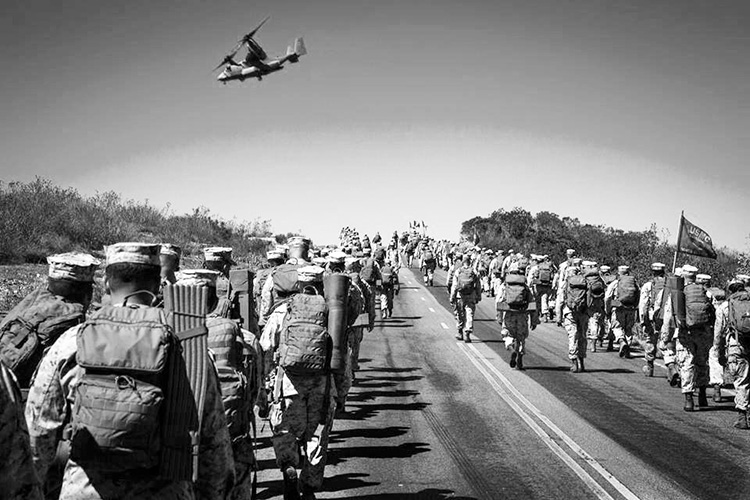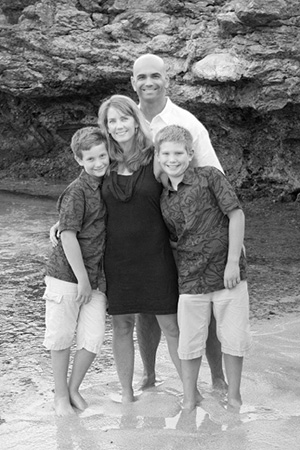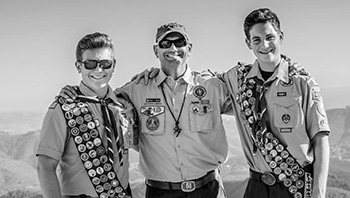 Editor’s Note: This is the 28th chapter in Volume 3 of Publisher and Editor Donald H. Harrison’s 2022 trilogy, “Schlepping and Schmoozing Along the Interstate 5.” All three books as well as others written by Harrison may be purchased from Amazon.com
Editor’s Note: This is the 28th chapter in Volume 3 of Publisher and Editor Donald H. Harrison’s 2022 trilogy, “Schlepping and Schmoozing Along the Interstate 5.” All three books as well as others written by Harrison may be purchased from Amazon.com
Schlepping and Schmoozing Along the Interstate 5, Volume 3, Exit 62 (Las Pulgas Road): Marine Corps Training Area
From Northbound Interstate 5, take Las Pulgas exit, which is approximately halfway through Camp Pendleton. For those with permission to enter the base, this exit offers quick access to the beaches, training areas and the artillery range.

 CAMP PENDLETON – The previous chapter related the career of Navy Capt. Irv Elson, who had served as chaplain of the Camp Pendleton-based I Marine Expeditionary Force before moving on to the Pentagon to become the deputy chaplain of the Marine Corps. One of the units with the I-MEF is the Marine Logistics Group (MLG), which then-Major Brian T. Grana was a member of from 2006 to 2009. Later in his career, as a lieutenant colonel, Grana commanded a Squadron at MCAS Miramar.
CAMP PENDLETON – The previous chapter related the career of Navy Capt. Irv Elson, who had served as chaplain of the Camp Pendleton-based I Marine Expeditionary Force before moving on to the Pentagon to become the deputy chaplain of the Marine Corps. One of the units with the I-MEF is the Marine Logistics Group (MLG), which then-Major Brian T. Grana was a member of from 2006 to 2009. Later in his career, as a lieutenant colonel, Grana commanded a Squadron at MCAS Miramar.
Near the Las Pulgas gate of Marine Corps Base Camp Pendleton are the training areas and artillery ranges with which every Marine assigned to that base becomes familiar. “One of the biggest training expeditions I had was up by Las Pulgas,” Grana recollected in a June 2022 interview. “You can see the area from Interstate 5. In field training, you send the whole unit out to the field, all the cooks, bakers, and candlestick makers, the security personnel, to get everything set up, everything you need to operate in the field. You do force-on-force training and when you are maneuvering, you are shooting, moving, and communicating.”
“We did a lot of shooting and training at the ranges near Las Pulgas,” he added.
Although Camp Pendleton was his unit’s home base from 2006 to 2009, its members would go on overseas deployment for months at a time before returning to Camp Pendleton. In the three years that he was there, Grana left from Camp Pendelton for his second deployment to Iraq, then later went to Jordan, and finally transferred his unit for service aboard the three amphibious ships comprising the 13th Marine Expeditionary Unit. After Camp Pendleton, he was transferred to Quantico, Virginia, next to Hawaii, and finally to the command of the Marine Wing Support Squadron at Marine Corps Air Station Miramar. Because he tragically became a widower, Grana retired from the Marines as a lieutenant colonel to take care of his two sons, Jake and Lucas.
During his second deployment in Iraq, Grana, who is Jewish, “led a small team of Marines and one Navy corpsman and we lived with Iraqis for six months on the Iraqi-Syrian border,” Grana said. Being at the border of two Arab countries, neither one of which to this day recognizes Israel, and, in fact, both are hostile to the Jewish state, Grana “made a point that nobody knew my faith. I did not advertise at all.” Occasionally, he would be asked by Iraqis to identify his religion. “I had a wonderful mentor (Major) General Juan Ayala. He sat down with all the teams before we went. He said ‘You are going to be asked about your faiths, all of you. I don’t know your faiths, but here I a response that you can give to reset the bar and humanize yourselves in the eyes of our allies. We are all the sons of Father Abraham.”
Besides not wanting to expose himself or his team to religious hatred, “I wouldn’t have wanted to put any Iraqis in a compromising position if they had become friends with me and someone found out that I was a Jew,” Grana said. “It could have created drama for them and their families.”
Grana said out in the field, there is no reason to talk about religion. “That is part of my pride in being a Jew: Our relationship is directly with God. There are no interlocutors, nobody else. It is all your relationship, how you hold yourself accountable, and how you try to live as best as you can within the tenets of the Commandments and the lessons in the Torah and the Talmud. Throughout my entire military career, I thought the best way to celebrate my faith was just to celebrate it myself and not wear it on my sleeve.”
The assignment in Jordan in 2008 was to “open up the Aqaba port so that we could bring in more supplies to Iraq via Jordan. I came back and became part of what is called a ‘Marime Expeditionary Unit (MEU) for the better part of 2008 through 2009. I was on board ship.”
With no hostile forces aboard the USS Comstock, Grana felt more comfortable with public displays of his Judaism. “On board ship, we found several Jews between the Sailors and the Marines, and we would actually hold services,” he said. “We would try to get together to the best of our abilities and at least talk about Judaism. When you get together, there is that commonality and the ability to let your guard down and address issues that are very specific to your demographic.”

While he was on his various deployments, his wife, the former Carey Patricia Lindholtz, taught elementary school, obtained a master’s degree in counseling, worked on her doctoral degree in Educational Leadership, and for nine years fought the effects of a brain tumor. “We found out about it in 2003,” Grana said. “Prior to my 2007 deployment [to the Iraq-Syria border], she had brain surgery. Dr. Michael Berger of UC San Francisco was actually fascinated with her case. He was a leading doctor in this field. He couldn’t understand how someone with a tumor that size was so high functioning. In 2006, she had a 92 percent resection of the tumor. For an hour and a half, they had to map her brain. She was fully awake while they did that, and it was a 15-hour surgery. As they were coming out of the surgery, the doctor said, ‘Your wife is an absolute warrior.’ He said that within five years something was going to happen, but he didn’t know what or when, saying her whole case was a mystery to him. The next morning when she came to from the anesthesia, she said, ‘I only have a couple of months to get well and healthy. I have to be 100 percent because you have to deploy in March.’ I said, ‘Are we really having this conversation now?’ and she said, ‘We are a Marine family. That is what we do. I have to get well so you can deploy with 100 percent clarity that we are okay back here.’ I thought, ‘Man, who is the warrior in this family?’”
Carey and Brian were sweethearts ever since his sophomore and her junior year together at Coconut Creek High School in Florida, where Brian co-captained both the football and baseball tams and also served as class president for four years. While Brian was the athlete, Carey was the Honors Student who served on the student council and played on the girls’ softball team which Brian’s father, David, coached. One day, while driving Brian home from school, his father turned and said, ‘You know, it’s none of my business but that Carey girl is something special.” Brian’s mother, Barbara, reinforced the message, when she suggested that they buy balloons and treats for Carey’s birthday on January 26th. Brian demurred saying Carey was not his girlfriend and his mother gave him a look that said, “You are a knucklehead, that is a really good girl!” Not long afterwards, Brian and Carey started dating seriously.
Because of his leadership and athleticism—and the fact that his team won their first Broward County football championship—Brian was recruited by five service academies – Navy, Army, Air Force, Coast Guard and Merchant Marine. He said the Navy and the Marines seemed to offer more career possibilities than the other services. Additionally, he said, “it fit with my personality; growing up in the Fort Lauderdale area by the beach, the ocean is in my blood.” Carey’s too.
Before entering the Naval Academy at Annapolis, Maryland, he attended a prep school with 300 other students in Newport, Rhode Island, to bolster his academics. “I like to say (with a smile) that I graduated in the top 88 percent of my class at the Naval Academy,” Grana said. “I was focused on being a good Midshipman, a future military leader; keeping my nose above water academically, and playing football. That (football) was what got me there and I fought tooth and nail to stay there and pay my debt because I never would have had this opportunity otherwise. Football is a leadership laboratory where I learned a lot about people, human relations, and conflict. I know many people who dropped out of the Academy because they couldn’t handle the effort required for all three: military, academics, and sports.
Grana suffered three knee injuries which limited his football playing time, but in his junior year, he played tight end in a nationally televised game against Notre Dame University. “I actually scored a touchdown,” he said, quipping that “I always want to be everyone’s second favorite ‘Hebrew’ (a word he uses interchangeably with ‘Jew) and how ironic was it that I scored a touchdown on the Jesus side of the field!”
In his four years at Annapolis, Army defeated Navy four straight times by narrow scores. “You could lose all the other games but if you beat Army, you could hang your hat on that,” Grana said ruefully. “From the time you step on The Yard (the Naval Academy’s nickname for its campus) it’s ‘Beat Army this and Beat Army that.’” In sportswriter John Feinstein’s 1997 book, A Civil War: Army vs. Navy, A Year Inside College Football’s Purest Rivalry, Granta’ss contributions to the program and the overall Navy Football Brotherhood rated a mention.
Meanwhile, Carey transferred from a community college in Florida to the University of Maryland to be near Brian. Unbeknownst to him or any of his family members or friends, Carey, who described herself as “Christmas Catholic,” studied for conversion to Judaism under the watchful eye of Rabbi Jonathan Panitz. She had become familiar with the faith by attending services with Brian at his Conservative Temple Beth Am in Margate. She also had participated in Passover seders led by Brian’s grandfather Sidney Rosenberg and other Jewish-oriented events at the Grana home. As a matter of coincidence, Grana’s father David had converted from the Lutheran faith to Judaism before marrying Grana’s mother Barbara. So it was too with Carey, who was married to Brian in March 1997, almost a year after he was commissioned as an officer in the Marines.
Grana said he chose to join the Marines just after completing his plebe (freshman) year while attending a required Marine Leadership Training course at Quantico, Virginia. “There’re type-A people and there are marines—a whole organization that is Alpha,” he said. “Because of my time playing contact sports, when I got there something resonated. We were running on a back trail over at Officer Candidate School, and I thought ‘Oh my gosh! These are my people!’” At one point, he had thought he wanted to be a Navy pilot, but “it was an epiphany” that what he really wanted to be was a Ground Marine.
His first duty assignment was in Okinawa, Japan, as a platoon commander for a motor transport company. Next, he was assigned to logistics, where he dealt not only with motor transport but also supply, maintenance, health services, and engineering. He became executive officer of two companies and wound up a four-year stay as a company commander of a Landing Support Company. Carey meanwhile obtained a master’s degree in counseling.
“Carey and I were away from our family on the other side of the world,” he recalled. “We were learning to grow as a couple –a Jewish couple. We would try to go to services whenever we could. Carey would always light the Shabbos candles. We never felt closer as a couple than when we would go to Temple and hold hands. She worked on becoming a new teacher and I on becoming an officer and we were very supportive of each other. We knew this was our one shot as a couple before we had kids.”
One night while the couple was sitting at the dinner table, Carey told Brian that one of her second-grade students had bitten another student. “That’s funny,” he remarked. “I had a Marine bite another Marine.” That prompted recognition that “the degree of separation between young people is not too much. She separated them in the classroom, and I separated mine. I am sure her response was more cotton candy and chocolate-dipped strawberries, but mine not so much!”
After Okinawa, the couple moved to Monterey, California, where Brian attended Naval Postgraduate School. A few months after the transfer, “I was on a morning run and on the final stretch it came over the radio that a plane had just hit one of the Twin Towers. I kept running. I got to the fitness center and as I walked in the door, a plane hit the second tower and someone yelled out, ‘We are going to war.’ Within an hour of all that happening, they sent all the students home. The base went on lockdown. I’ll never forget. I walked through the door of our home and Jake was barely six months old, looking like a little marshmallow, and he was in front of the TV doing patty cake on the ground. On the TV screen, there was a repeating loop of the towers coming down. I remember picking him up and saying, ‘Son, your eyes should not be seeing this.’ I moved him from the television.”
After graduate school, Grana was transferred to Indian Head, Maryland, where he joined a Chemical/ Biological Response Unit. He was there from 2003 to 2006. During this period, he was sent to Iraq on his first tour, where he served as a deputy contracting officer out of Camp Fallujah. Among many things, his job was to professionalize the procedures for working with local contractors who were supporting all of the operating forces in western Iraq.
“I first walked into my office and there was a brick of money sitting on my desk,” he said. “A brick was about $1 million in cash and there was about $850,000 remaining of that brick because they were literally paying people who were living around the base and supporting the American forces to do work for our effort. We would let contracts with local nationals and third-country nationals for just about anything and everything it takes to run a city: Trash pickup, electricity, paving roads, building buildings, repairing buildings, putting in electrical grids, putting in runways, rebuilding hangars, anything needed to make a city function. We obligated hundred of millions of dollars.”
He added that it was “the hardest set of months I worked in my life, sunrise to sunset, easily putting in 18-hour days. Working in an office, there is something to be said about hearing a rocket go over the little tin can of a shelter that you are in or having mortar rounds land about 50 yards from your door. We were in a part of the base that was very exposed because all the third-country nationals and local vendors were nearby looking for work. The last big contract I signed was for the work for all the barriers that would go around the voting centers for the Parliamentary Elections in Iraq, which were scheduled to happen in late 2005. I closed contract negotiations less than an hour before a helicopter landed to take me out.
“It was an incredible time of responsibility during that time of my career,” he reflected. “I got to interface directly with the commanding general and the deputy commanding general of the Marine forces as well as travel all over western Iraq. As quirky as it sounds, I was one of the few people in the field who was authorized to obligate large sums of money. That is not to say that I had sole authority. There were checks and balances as well. But my position in the chain gave me a lot of visibility with a lot of people.”
Another exciting time in his military career was wen he was assigned to the Indo-Pacific Command, which was based in Hawaii. “It is in charge of everything militarily that goes on in the Pacific Rim, so it’s from the West Coast of the U.S. to the East Coast of Africa and everything in between, from polar bears to penguins. It was massive. I lived and worked in a vault for three years. I had top secret clearance, and it was fascinating.”
After a tsunami hit Japan on March 11, 2011, killing more than 20,000 people and leading to a nuclear meltdown at the Fukushima Daiichi Nuclear Power Plant, Grana was dispatched there to help with international relief efforts. He led “an intergovernmental team to get barges with fresh water to shoot into the reactor because shooting seawater had created a large sarcophagus with all the water melting off and only salt left.”
He was promoted in 2012 to Lieutenant Colonel and notified he would command the Marine Wing Support Squadron about the same time that Carey’s brain tumor came back aggressively. “From the time we found out and took her to the emergency room to the time she passed was 32 days,” Grana said. Her ashes were scattered at sea by her favorite beach in San Diego.

Their sons, Jake and Luke, respectively were 11 and 9 when their mother died. Carey’s sister, Joellen Lindholtz, was recruited to help raise the two boys. “Basically, I said I will bring you in as the nanny, and whatever you are making, I will pay you a little more than that,’ Grana said. “She lived with us until Jake got his driver’s license, and after that she was able to move out. Super Auntie Jo kept our crazy train on the tracks.”
Jacob subsequently enlisted in the Marine Corps and at the time of my interview with his father, he had just been assigned to duty at Marine Corps Air Station Miramar. Since returning from Israel, where he was studying from September 2021 to May 2022, Lucas was pursuing a Business Degree and a career in musical theatre. The two brothers are both Eagle Scouts and, by all accounts, happy with the current trajectories of their lives.
When Carey died, Brian had 17 years active duty as a Marine. The command of Marine Wing Support Squadron 373 would essentially be his last major post prior to retirement. The squadron’s “core task is to build expeditionary airfields. It is a massive engineering/ construction/ logistics unit that at the time had 77 different job specialties within the unit. Over the course of my time there, I estimated that I had 1,200 Marines and Sailors who worked with me in that unit over two years at different locations.”
Was this a Marine version of the Seabees? I asked.
“Exactly,” he replied. “Except that we are much smarter and better looking. And we can shoot straight.”
After retiring from the military, Grana worked in Escondido for HMT Electric and Renewables. It took some time getting used to work for people much younger than himself, but while he was in the military, his bosses were gaining expertise in their industry. “That is all part of the transition process” from military to civilian, Grana said. “I was far and away the oldest person in the office.”
At the time of our interview, Grana was in his second civilian job, serving as a senior consultant for Tysons, Virginia-based Logistics Management Institute, which describes one of its missions as providing “scientific, technical, engineering, and program support services” to the Department of Defense. One of its contracts, announced in April 2022, was to help the U.S. army “detect and respond to chemical, biological, radiological, and nuclear threats.”
Grana worships and attends Torah study sessions at Temple Solel. He also has been active in military support groups. He served six years on the board of the Marine Corps Association & Foundation, and at the time of our interview was a trustee for the Naval Academy Alumni Association’s Athletics and Scholarships Board. He also was serving on the bard of the San Diego Military Advisory Council Foundation and helped to found a networking organization called the Veterans Beer Club.
I asked at the conclusion of our interview what advice he would give to a Marine Corps officer becoming a commander for the first time.
“Your number one job is that you are the morale officer,” he answered promptly. “You have an entire staff that can run all the technical stuff and all of the planning and all of the real functionality—the operational part of the unit. Your job as a commander is to really find out how can be a leader of your people and how you can take care of them. If you can take care of them, they will take care of you 100 times over.”
After Carey died, he said, he threw himself into figuring how he could help his Marines and Sailors by living as a Servant Leader “serving others first before you serve yourself. But you have to lead yourself first before you can lead others. It made my command an amazing experience and it could have been a horrible experience doing it without Carey by my side.”
*
Donald H. Harrison is publisher and editor of San Diego Jewish World. He may be contacted via sdheritage@cox.net